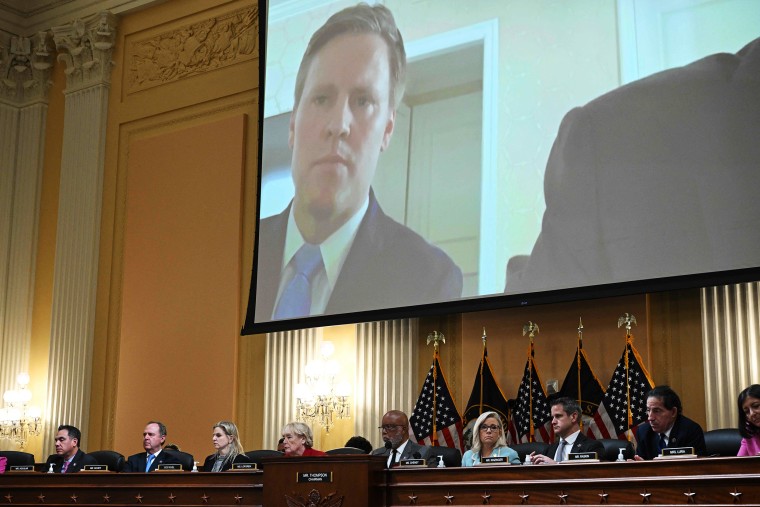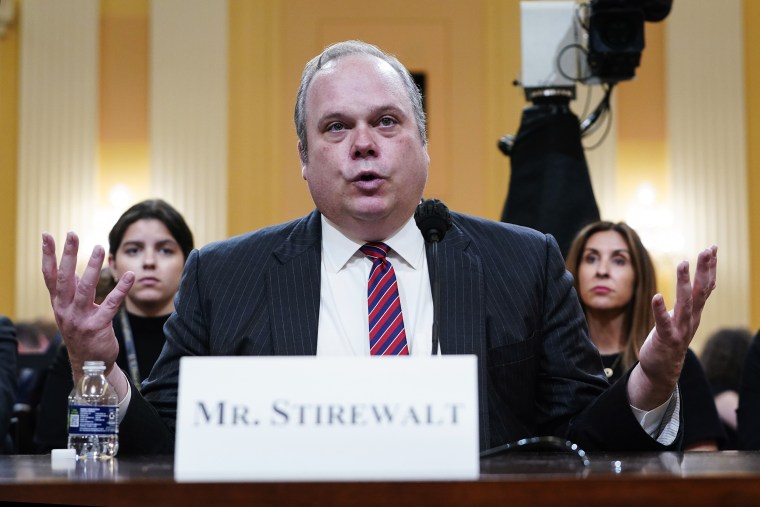WASHINGTON — On Election Night 2020, Donald Trump was bombarded by top aides telling him that he had lost and that his claims about voter fraud were “completely nuts," according to their own testimony played Monday by the House Jan. 6 committee.
Instead of listening to White House and campaign aides, the advisers said the former president sided with a “definitely intoxicated” Rudy Giuliani to launch a movement that culminated in the Jan. 6 attack on the U.S. Capitol.
In its second hearing, the committee played a series of video testimony from some of Trump’s closest political and legal advisers who were virtually unanimous in saying they urged the president that claims of massive fraud were "completely bogus" — and at every overture, Trump simply ignored them and opted instead to listen to Giuliani.

“That’s not the approach I would take,” Trump’s tight-lipped son-in-law, Jared Kushner, said he told the president. “He said, 'I have confidence in Rudy.'”
Eric Herschmann, one of Trump’s own attorneys, said the legal claims advanced by Trump’s Giuliani-led circle of outside legal advisers were “completely nuts.”
Trump's former Attorney General Bill Barr was particularly verbose, using words like "idiotic," "rubbish," "nonsense," "crazy," "stupid," "silly" and "annoying" to describe fraud claims made by Trump and the Giuliani circle he increasingly relied on as his professional campaign and government staff grew alienated from the president.
"Out of the box on election night, Trump claimed there was fraud and this happened before there was any potential evidence,” Barr testified on camera, adding later that he “told the president it was bullshit."
Barr said Trump became more and more isolated from the evidence and anyone willing to challenge him as the weeks after the election wore on, even as the campaign struggled to find any law firms willing to take them on as clients.
“I thought, boy, if he really believes this stuff, he has lost contact with— he’s become detached from reality if he really believes this stuff," Barr said of a breaking point he had in December.
"He’s become detached from reality if he really believes this stuff."
Former Attorney General William Barr
Richard Donoghue, who was the acting deputy attorney general at the time, said he went case-by-case with Trump to debunk every allegation of fraud, but Trump would just move on to another one and then another one as each got knocked down.
"I told him [Trump] flat out that much of the information he was getting was false or not supported by the evidence," Donoghue said. "He wouldn't fight us on it, but he'd move to another allegation."
While the committee’s first hearing last week focused on the attack itself, Monday’s program aimed to show that Trump knew he had lost the election and intentionally used phony evidence and outright lies to try to stay in power and gin up the movement that led to the violent insurrection last January.

The committee sought to underscore the point that Trump himself was chiefly responsible for propagating the lies about the election and that the “Stop the Steal” movement was not a grassroots movement on which Trump seized, but rather one he sparked from the top down.
“The election fraud claims were false. Mr. Trump’s closest advisers knew it. Mr. Trump knew it,” said Rep. Zoe Lofgren, D-Calif., a committee member. “The attack on Jan. 6th was a direct and predictable result of Mr. Trump’s decision to use false claims of election fraud to overturn the election and cling to power.”
To illustrate the point, the committee played a series of interviews with pro-Trump protesters on Jan. 6 who parroted his false claims about the election, down to arcane specifics about issues like the software used by Dominion voting machines.
"I don’t want to say that what we’re doing is right," said one man, apparently coughing from tear gas inside the Capitol, "But if the election is being stolen, what is it going to take?"
Committee investigators also traced the money Trump and his allies raised from small donors by stoking election fraud fears, which they said totaled more than $250 million.
And while the money was billed as going to "The Official Election Defense Fund," two Trump campaign staffers testified that the fund did not actually exist and was just a "marketing" tactic. Instead, investigators said most of the money went to Trump's new super PAC and was not spent on "election defense."
In his testimony, Bill Stepien, Trump’s 2020 campaign manager — who withdrew from participating at Monday's hearing in-person because his wife went into labor — said he and a group of other senior aides gathered outside the Oval Office on Election Night to essentially try to talk Trump down from his conspiracy theories.
Stepien said as votes were being counted, it became clear to aides with the president that night that Trump’s chances of victory were “very very bleak.”
"We told him, the group that went over there...chances for success at this point and then we pegged it at, 5, maybe, maybe, 10 percent based on recounts...[and] realistic legal challenges,” Stepien said.
“My recommendation was to say that votes were still being counted. It’s too early to tell," Stepien continued. “The President disagreed with that. ... I don’t recall the particular words. He thought I was wrong, he told me so, and that they were going to go in a different direction."
Stepien — who entered national politics working on former President George W. Bush's 2004 re-election campaign and then was a top aide to former New Jersey Gov. Chris Christie — remains aligned with the Trump-wing of the GOP. His political consulting firm is currently advising a conservative candidate in Wyoming’s August GOP primary trying to oust Republican Rep. Liz Cheney, who has broken with her party to become perhaps the most visible face of the Jan. 6 committee’s work.
Stepien and other aides said Giuliani, the former New York City Mayor, arrived and began to push Trump to declare the election stolen.
“The mayor was definitely intoxicated,” said Trump senior adviser Jason Miller, who remains in Trump's orbit. “There were suggestions by, I believe it was Mayor Giuliani, to go and declare victory and say that we’d won outright.”
Robert Costello, an attorney for Giuliani, told NBC News: “Mayor Giuliani denies that he was intoxicated and denies that he was drinking at all, and he suggests that you talk to other people who were there.”
Costello added that in Giuliani’s nearly eight-hour interview with the committee, no one asked him any questions about this.
In court, Trump’s campaign lost 61 cases and won only a single minor one, which did not affect the vote count for either candidate.
"They did have their day in court," Ben Ginsberg, perhaps the country’s foremost Republican election attorney, told committee members. "In no instance did the court find that the charges of fraud were real."
Trump responded at length Monday evening in a 12-page statement blasting the Jan. 6 committee and repeating many of his election lies and conspiracy theories. He did not go after any of the witnesses whose testimony was showcased on Monday.
The first hearing was held in prime-time Thursday and drew about 20 million viewers.
The next hearing, scheduled for Wednesday morning, will focus on Trump's attempt to “corrupt the Department of Justice” and state election officials. A fourth hearing, set for Thursday afternoon, will focus on Trump’s efforts to pressure Vice President Mike Pence against certifying the results of the election on Jan. 6.
Later hearings will focus on what Trump did on Jan. 6 itself.
